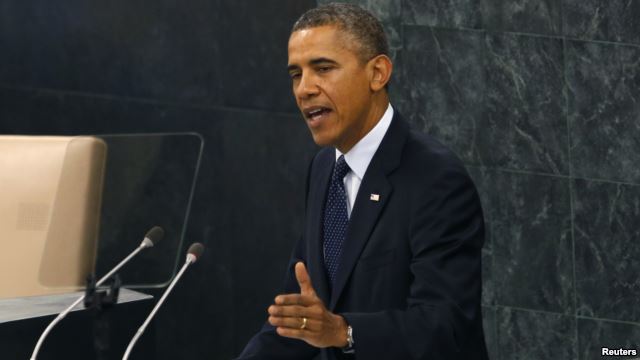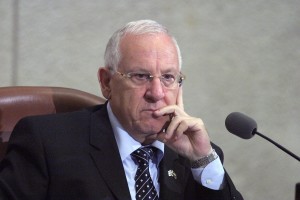by Mitchell Plitnick
Once again, in his speech Wednesday at the United Nations, President Obama revealed the reduced importance of the Israeli-Palestinian conflict on his agenda. He also revealed just how out of touch his entire country is with respect to reality.
The Israel-Palestine conflict was the last specific global issue mentioned by Obama in his address to the UN General Assembly, and his wording was straight out of the playbook. It was also only mentioned briefly and without any hint that the United States would be taking any action at all on the issue.
Here’s what he said:
Leadership will also be necessary to address the conflict between Palestinians and Israelis. As bleak as the landscape appears, America will never give up the pursuit of peace. The situation in Iraq, Syria and Libya should cure anyone of the illusion that this conflict is the main source of problems in the region; for far too long, it has been used in part as a way to distract people from problems at home. And the violence engulfing the region today has made too many Israelis ready to abandon the hard work of peace. But let’s be clear: the status quo in the West Bank and Gaza is not sustainable. We cannot afford to turn away from this effort—not when rockets are fired at innocent Israelis, or the lives of so many Palestinian children are taken from us in Gaza. So long as I am President, we will stand up for the principle that Israelis, Palestinians, the region, and the world will be more just with two states living side by side, in peace and security.
Could this have been any emptier? Just last month, Israel and Hamas were engaged in the biggest uptick in violence since the Second Intifada was in full swing.
The message from Obama comes through, though: We’re no longer interested in forcing the parties to the table. The subtext behind that is a US surrender to the stubbornness of the far-right wing government running Israel these days. The US will stop pressuring Israel for talks, and indeed, it already has. The question this raises, of course, is how the Obama administration will respond when and if the Palestinian Authority makes good on its repeated threats to bring this issue to the UN and the International Criminal Court.
In such a case, Obama will undoubtedly condemn the Palestinians’ “unilateral action”—de facto US policy dictates that when the Palestinians take action, it is to be condemned, but when Israel does the same thing, it is, at worst, “unhelpful.” Yet the real question for the Palestinians is whether the United States will have any other response outside of some pro forma public statement. Obama’s hands-off approach seems to imply that it will not, though Palestinian President Mahmoud Abbas would be unwise to count on that.
But there’s another piece of this statement worth examining. Obama said, as he has many times, that the situation is unsustainable. He also notes that one myth that has long been held by many has been exposed as false by recent events: the notion that Palestine is the key source of instability in the region.
Obama is correct about the exposed old myth, but he merely spouts another in its place. Of course the occupation will not remain the same as it is today. It has changed some of its characteristics, almost always to the detriment of the Palestinians, many times since 1967. But the essence of the matter, the relationship between an occupying power and an occupied people locked in a conflict over land, rights, narratives, nationalism and competing claims of justice, has endured quite well over those years.
The Israeli right-wing was long aware, and often stated, that their subjugation of the Palestinians was not the main cause of instability in the region. Of course, there was a time when there was a much stronger argument for that myth. When the many Arab regimes, throughout most of the 20th century, were comfortably entrenched in power, things were pretty stable, as they often are under dictatorships that maintain their control. Under those circumstances, the cry of “Free Palestine” was heard much more loudly, as it was the only one the dictators would permit. Due to many factors (especially the US invasion of Iraq), that stability was shattered and, as one would expect, much of the Arab world, while not forgetting the Palestinians, demonstrated a focus on the miserable conditions they themselves were living in, and conflicts within their own countries. Thus, the myth was exposed.
But we don’t need a shakeup like the Arab Awakening to see that the claim that the occupation is “unsustainable” is a myth. We really need only see that it has endured for more than 47 years, and when circumstances did threaten the status quo, Israel adapted its occupation to meet those circumstances. The most obvious example of that is the massive tightening of the occupation and even more massive expansion of settlements that constituted Israel’s response to the Oslo Accords.
It’s a truism that any oppressive regime eventually meets its demise. That is clearly not what Obama means when he calls the occupation “unsustainable.” Rather, he means what so many others mean: Israel cannot continue to hold millions of Palestinians without rights. But, like so many other myths around Israel-Palestine, this one doesn’t bear scrutiny. Israel has done this for 47 years, and can do it for the foreseeable future. The demise of the occupation regime will come, as the demise of all regimes eventually come. But there is nothing particularly unsustainable about this one.
The Israeli right has become the Israeli mainstream, and they are busily coming up with ideas for how to sustain this occupation or, as Foreign Minister Avigdor Lieberman likes to put it, “manage” the conflict. They recognize that the fear, ingrained in the thinking of many of the early Zionist philosophers of a Jewish Israel ruling over a majority of disenfranchised Muslim and Christian Arabs is unfounded. It turns out that contrary to the expectations of the early Zionist thinkers, Israelis can live with denying rights to Arabs, and the world is prepared to tolerate it, despite the clucking of tongues it evokes.
This issue can be traced back all the way to Theodor Herzl, and it was actively dealt with by Israel’s first Prime Minister David Ben-Gurion and, most notably, by the person in charge of land acquisition for the Jewish National Fund both before and after the State of Israel was established, Yoseph Weitz. In modern times, this notion has been expressed as a “demographic time bomb,” most notably by Netanyahu’s predecessor, Ehud Olmert.
But there’s no reason to believe this is really a problem. After all, according to the February 2014 report of Israel’s Central Bureau of Statistics, there are about 6,119,000 Jews in Israel and the West Bank. Between the West Bank, Gaza and Israel, there are some 5,894,631 Palestinians, according to the CIA World Factbook. Given the different population growth rates, Palestinians will be a majority very soon, but the day that happens, what is going to change? On the ground, in day to day life, what will be different than the day before?
The answer, of course, is that nothing will change and the Israeli right-wing understands this. The United States, on the other hand, apparently does not. More to the point, the many activists who believe that Jews going from 51% of the population to 49% of it will suddenly mean that Israel is an apartheid state, as both Olmert and another former Prime Minister, Ehud Barak warned, also do not understand that when that line is crossed, nothing will change. Nothing will change when that so-called demographic time bomb goes off.
So, while right-wing leaders like Naftali Bennett consider ways to continue to “manage” the Palestinians indefinitely, Obama and a great many others, in the United States, Israel, Europe and even some among the Palestinians, continue to engage in myth-making and wishful thinking.
If this conflict is ever to be resolved, the only path to it entails full acknowledgment of the realities, on the ground, in the international diplomatic sphere and in politics. Anyone who truly believes that the demographic counter clicking down to under 50% Jewish will somehow shock the Israeli people and their government into recognizing the injustice of the occupation is engaging in fantasy. Such demographic changes are gradual, and this cushions the change so it is not a shock. In 1960, Whites, who were always an overwhelming minority, made up less than 20% of the population of South Africa, and Jews are unlikely to ever be anywhere near that small a minority in Israel-Palestine.
This is only one of many myths that need to be abandoned for any kind of resolution to be possible. It’s no less important to dispel these fanciful notions than it is to counter the stereotypes of Palestinians that are so widely held in the United States, Israel and elsewhere (like “they just want to kill the Jews” for instance). One way we will know people are serious about taking on this vexing conflict is when we see them abandon false notions and recognize that Israel-Palestine can contribute to a better world simply by ending the injustice and violence. When that’s the motivation, and it is applied to both sides, we’ll be getting somewhere.






There are two points that arise from this article.
Firstly, when Obama says the Palestine situation is unsustainable, he may be referring to the situation in Gaza, where most estimates are that the whole area will be unliveable within less than 5 years. This may be what lies behind reports that the Egyptians are offering an area of the Sinai to the Palestinians as their own homeland, which will be coterminous with the Gaza Strip but will involve mass population transfer from the West Bank to the Sinai. That way, the prospect of a sustainable solution becomes possible, provided all the local and refugee/right of return Palestinains agree to move en bloc to the Sinai.
Secondly, while conflict in the area has tended to over-shadow the Palestinian problem for now, the fact of an unfree Palestine still remains – and will continue to remain – at the heart of all Middle East conflicts. If and when all the current conflicts come to an end, Palestine will still remain at the heart of all Middle East conflict, as no one living there can accept European and US colonisation projects in that part of the world. It is an unsolvable problem – for ever.
Two things make the future look bleak:
— Rising oil costs will make mechanized warfare more difficult,
— Rising temperatures will make the Promised Land more like Death Valley.
Thanks Mitchell for a great, level headed balanced article, something that hard to find these days.